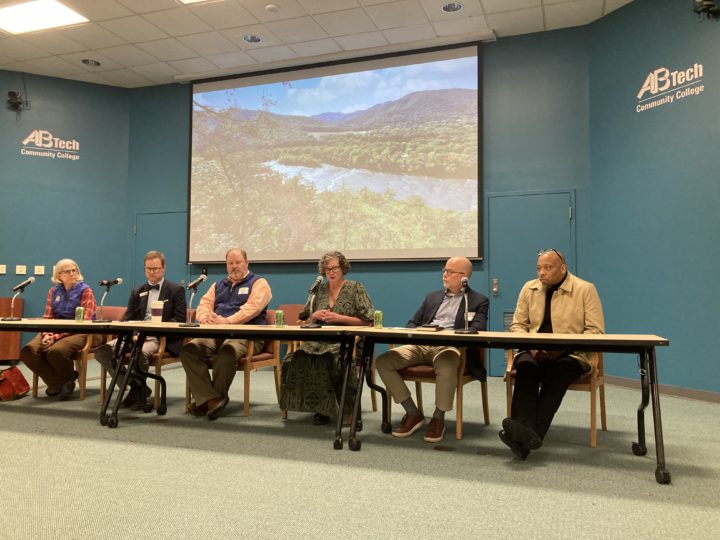Five years into its work connecting governments, nonprofits, business leaders and other stakeholders to maintain and improve the health of the region’s largest river, the French Broad River Partnership hosted its largest annual meeting yet at A-B Tech on Nov. 8.
More than 200 river rats, advocates, conservationists and economic stakeholders from a seven-county region filled Ferguson Auditorium to celebrate their successes and discuss ways to continue cleaning up one of the world’s oldest waterways to maximize its environmental and economic sway.
“We’ve come a long way and there’s still far to go. Today is a wonderful moment to reflect and showcase all that we have accomplished so far. It’s also an important moment that will inspire our next chapter,” said Jane Margaret Bell, chair of the partnership’s steering committee, in opening remarks.
Two themes ran through three panels over three hours — the ecological health of the river and its status as an economic engine.
Illustrating the latter, a 2021 economic impact study showed the river draws 6.9 million visitors to the region annually, bringing $3.8 billion to the region. The Upper French Broad watershed in North Carolina includes Transylvania, Henderson, Buncombe, Madison, Haywood, Yancey and Mitchell counties, home to more than 500,000 people, according to the 2020 census.
As for the condition of the river itself, a 19-mile section of the river earned a spot on the N.C. Department of Environmental Quality’s impaired list in 2022 due to an overabundance of bacteria, including fecal coliform bacteria, found in human and animal feces. River defenders urge farmers to keep livestock out of the river, builders to devise ways to divert stormwater runoff and homeowners to seek funding to repair aging septic systems.
Water pollution
In an illustration of the French Broad River’s long history with pollution, Asheville Mayor Esther Manheimer said longtime river advocate and Xpress columnist Jerry Sternberg helped her understand how polluted the river was in the former industrial area now known as the River Arts District. From car parts to batteries, the Asheville section of the river was rife with toxic trash as recently as 10 years ago before the city began revitalization of the area, she said.
A few miles west in Haywood County, Canton has the potential to dramatically improve the health of the Pigeon River, a major tributary of the French Broad that flows through the center of town. Canton’s paper mill, Pactiv Evergreen, closed this summer after more than a century in operation, leaving the town smelling better and the river looking cleaner by all accounts.

“The Pigeon River, since the closure of the plant, has already rebounded tremendously,” said Julie Mayfield, state senator and senior policy advisor for MountainTrue. More fish species have returned, and the water is cold and clear when it used to be dark and warm, she said, adding that the recovery came “a lot faster than anybody thought.”
Canton Mayor Zeb Smathers called revitalizing his town with the Pigeon River at the forefront a “mill town moonshot.”
“We get to do something that will determine the future economically, environmentally and culturally for the whole region. We get to do that. And we have to do it in a way that brings the very best innovation,” he said.
In one of the most touching moments of the event, Smathers recounted a story from the day the mill closed, eliminating 1,100 jobs in his small mill town.
He dropped off his 3-1/2-year-old son at preschool the morning of the closure, and as he looked out over his town, he realized the gravity of the moment from his son’s perspective.
“He will not remember the mill, he will not remember the workers, he will not remember the odor. But he will remember and judge us on what all of us do with the moment. If we capture the moment and do something that is amazing and respectful to the world around us and the people that occupy these mountains now and the ones that are coming, he will understand we met that moment,” Smathers said to applause.
The panel turned to Mayfield for insight into what assistance advocates could get from the N.C. General Assembly.
“If you’re looking for good policy on protecting water quality, don’t look to Raleigh. That’s not generally going to be a thing you’re going to find there,” she said. Funding, however, is a different story, she added.
Mayfield said then-State Sen. Chuck Edwards helped the region secure millions in funding for everything from landslide prevention measures to dam removals to researching the sources of French Broad’s pollution.
Mayfield encouraged the crowd to seek state funding for any project related to river health.
“There’s lots of opportunities,” she said.
The tourism perspective
In the third panel of the day, representatives from tourism development authorities, chambers of commerce, a whitewater rafting company, the Biltmore Co., Black Wall Street AVL and others gave their perspectives on the role the river plays as an economic driver.

Clark Duncan, senior vice president of economic development for the Asheville Chamber of Commerce, highlighted the importance of water as a natural resource for the area’s well-known brewing industry, which has an economic impact of over $1 billion annually in the Asheville metro area alone, one-third of the industry’s statewide footprint, he said.
“Preserving and protecting that natural resource, whether it’s from the North Fork [reservoir] or the French Broad, is critically important,” he said.
Further, in Asheville, Duncan noted that the river has become the city’s “downtown” as a hub of economic development, so protecting its reputation is vital to the continued investment in Asheville’s riverfront.
Offering a view from Transylvania County, where the French Broad originates near Rosman, the Transylvania Tourism Development Authority Executive Director Clark Lovelace shared a perspective of the river as someone who grew up in Brevard in the 1980s.
Back then, recreating in the French Broad “wasn’t even an option,” Lovelace said, because of the high bacteria levels and general litter in the river.
“So when you think back to then, and then you look at it today, there’s a part of me that says, ‘We’ve come a long way,’” he said. “That said, last time I went kayaking in the French Broad River, we encountered some water buffalo that were grazing in the river, as we were coming around the bend,” he added, referring to cattle.
“I think that that reminds you that we still have a long way to go.”
Fritz Johnson, co-owner of Blue Heron Whitewater, who has been giving visitors thrills on raft trips on the Madison County sections of the river for more than 30 years, said there is a big difference to how the water looks and feels compared with the 1990s.
“It’s rare for trailers to go floating down the river in high water. Now, there are still a lot of tires, but there are a lot [fewer] tires than there used to be,” she said without a smile.
Johnson said she gets bummed when people cancel their trips because they hear about the river’s poor water quality in Asheville, something that directly affects her business.
Lisa Raleigh, executive director of RiverLink and one of the event’s moderators, said that as pressures and opportunities have changed over the years, there’s more at stake than ever for the river that has given life to the towns and livelihoods in the region.
“It is vulnerable. It is fragile,” she said. “I’m really hopeful. The world is complicated. There’s so much going on, yet today, we took half a day to just focus on the watershed from all these different perspectives.”



Before you comment
The comments section is here to provide a platform for civil dialogue on the issues we face together as a local community. Xpress is committed to offering this platform for all voices, but when the tone of the discussion gets nasty or strays off topic, we believe many people choose not to participate. Xpress editors are determined to moderate comments to ensure a constructive interchange is maintained. All comments judged not to be in keeping with the spirit of civil discourse will be removed and repeat violators will be banned. See here for our terms of service. Thank you for being part of this effort to promote respectful discussion.